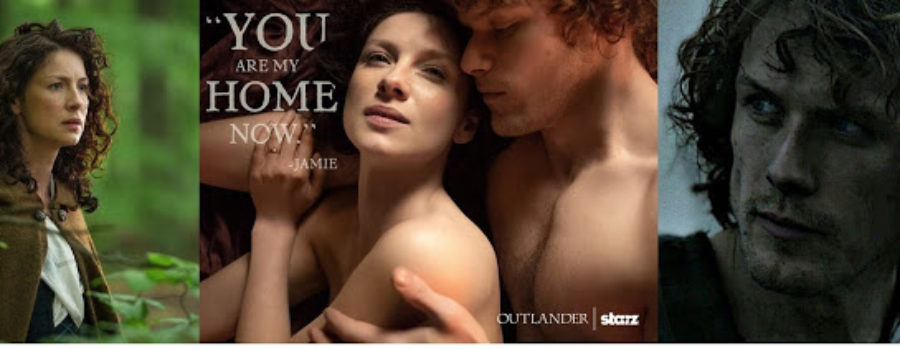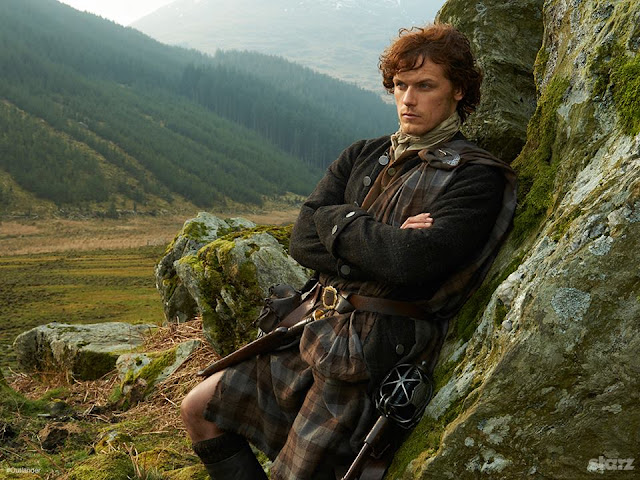The heart of Outlander is Claire and Jamie’s story, but it is also the stories of outsiders — those who find themselves through circumstance, birth, character or social position outside of society. The need and drive to belong — to a family, a home, a place — and to feel loved is a deep-rooted human imperative. We all know or have personally experienced the cold and darkness outside the family hearth. It’s a lonely place. In their own ways, both Jamie and Claire are outsiders, living outside the bonds of Clan and family. And as we all saw, two outsiders can most certainly band together to create their own sense of home, but let’s dig a little further into how they got there…
Claire Elizabeth Beauchamp Randall Fraser
Claire is the epitome of this “outsider” theme of Outlander — the 1940s Sassenach who finds herself transported to 1740s Scotland. She struggles to come to terms with landing in the midst of a strange culture, with people who speak a foreign language, Gaidhlig, and view her with suspicion and dislike. She is a member of the hated auld enemy — an English woman, a Sassenach, an Outlander.

Claire became an outsider after her parents were killed when she was a child. Under the aegis of her beloved Uncle Lamb, she never goes to formal school and instead lives a nomadic existence on archaeology digs in foreign cultures and countries. She belongs nowhere and has no permanent home. Even when she marries Frank, their wartime marriage separates them and she lives in the ever-shifting camps of the European battlefields. There is the ever-present threat of death, the ongoing pain of the wounded soldiers she treats and those she sits by as they die. As a nurse, she has to maintain a certain clinical distance from her patients or she would be unable to function in that role. This hones an edge of ruthlessness allied to deep compassion for suffering. And while it marks her — mind, spirit and soul — it will also come back to haunt her.
All of this, of course, gives her greater resources to deal with her sudden uprooting and landing in 1743 Scotland. It also gives her a great longing for a real home, a place where she can set down roots. Despite her upbringing, Claire experiences social isolation and feelings of dislocation along with stress and fear. The experience of migration, whether voluntary or forced, leads to a loss of all that is familiar and the need to adapt to a new country and culture.
Notwithstanding her struggles to get back to Frank and the 20th century, part of Claire fears that will never happen. If not, how might she find herself a place, and a home, as a stranger amongst strangers? Claire carves out a place for herself as a healer, an integral part of Claire’s identity, no matter where or when she might find herself. Her first contact with Jamie is when she reduces his dislocated shoulder then, in short order, patches him up from a bullet wound.The practice of medicine is essential to Claire —it’s her vocation that drives many of her choices.
In Outlander, she muses, “Feeling flesh and blood beneath my fingers, taking pulses, inspecting tongues and eyeballs, all the familiar routine, had done much to settle the feeling of hollow panic that had been with me since my fall through the rock. However strange my circumstances, and however out of place I might be, it was somehow very comforting to realize that these were truly other people. Warm-fleshed and hairy, with hearts that could be felt beating and lungs that breathed audibly.”
In many ways, she is a wounded healer — someone who, through personal pain and loss, is drawn to heal and relieve the pain of others and in the process, subconsciously, heals herself. Healer heal thyself, in Latin Cura te ipsum, is an injunction in the book of Luke 4:23 that resonates with Claire’s experience as a healer. The healer touches the physical body with an intimacy usually only allowed by one’s most loved and trusted inner circle, thus establishing an intimate bond between the healer and the healed. Claire also understands very well that “Healing comes from the healed; not from the physician.” and some people recover from what appear to be fatal accidents, wounds or diseases just through sheer strength of character, stubbornness or an unwillingness to die at that time.
At Castle Leoch, first Mrs Fitz and then the Clan Chief, Colum McKenzie, recognize her healing skills, thus allowing her to find a temporary place to perch. She is, however, not trusted. She’s continually flocked by guards (Angus and Rupert), given limited freedom within the precincts of the castle and has to withstand Colum’s interrogations. The constant tension, fear and stress are exhausting. Claire turns more and more to the one friendly face in Leoch — Jamie. His promise, “Ye need not be scairt of me,” he said softly. “Nor anyone here, so long as I’m with ye.” seems to be all that she can hold on to at times.
Jamie, although a member of the extended Fraser/MacKenzie clans, is an outlaw with no place to call his own. An exile from Lallybroch and the Fraser clan, a wanted criminal by the British, he takes to the heather on more than one occasion subsisting on what he can hunt and gather. At age 14, he was sent to Castle Leoch to be tutored by his uncles, as was a normal practice in the Highlands in this time. At 18, he went to France to study at the Université and then joined Ian Murray as a soldier with the French army. Most of his adult life, therefore, was spent away from home. He lives a life of dichotomy — insider and, yet, outsider at the same time.
Jamie is also separated from his family through his guilt over his father’s death and Black Jack’s supposed violation and impregnation of his sister, Jenny. He has chosen exile as a form of punishment for his sins, and it serves the purpose of saving his family from any further difficulties with the British authorities. For Jamie, protecting his family and clan is at the core of his identity. He will suffer any hardships himself if it means the safety of those he loves.
Jamie promises Claire when they wed “You are safe,” he said firmly. “You have my name and my family, my clan and, if necessary, the protection of my body as well. No man willna lay hands on ye again, while I live.” He does not give promises lightly, and an oath sworn is one that Jamie will honor whatever the cost. We see again and again through the books how Jamie fulfills the archetype of protector/guardian/warrior, but it comes at a cost. That cost is exile — he experiences recurring separation as he is forced to live away from his native Scotland or suffers self-imposed absence from his country and home.

When Dougal and the war band return to Leoch, Jamie is tucked away in the stables, out of sight and hopefully trouble — much as Claire is tucked away in Davie Beaton’s dungeon-like surgery. Neither one is particularly welcome in the castle or by its inhabitants, but that doesn’t mean that Colum as the Laird can’t make use of them. Jamie does have some protection through his uncles, but this has very definite limits. Jamie and Claire eat together with the extended McKenzie clan in the Great Hall in the evenings, where Jamie acts as an interpreter for Claire. These meals and the ones Claire takes to the stables at lunch provide a respite from the loneliness each feels.
This is one of the reasons they are drawn to each other, apart from the fact that they are attracted to one another. This friendship develops on the road when they accompany Dougal, Ned and the other MacKenzies collecting Colum’s rents. Dougal’s cynical use of Jamie’s scarred back to raise funds for the Jacobite cause angers Claire and makes her feel more protective of him. She understands how humiliating he finds this exposure of the shameful scars, but does not at first realize how those scars demean him in the eyes of the other men. When she does so it makes her ‘fierce as a wee badger,’ to quote something Jamie says much later to Claire.
Black Jack Randall is the Deus ex Machina in their marriage. Time and again, one or the other finds themselves at his mercy requiring rescue by the other. This three-way conflict could have torn Jamie and Claire apart and led to her choosing to return to Frank when Jamie takes her to Craigh Na Dun the first time. Likewise with Jamie’s rape and violation by Black Jack Randall in Wentworth prison. It drives him into such a dark night of the soul that he considers suicide — a mortal sin for a devout Catholic like himself. The loss of his self and his manhood, as he sees it, and the destruction of a sacred part of himself tears him away from Claire and all others. He experiences a ‘ground zero’ of the soul. Claire is the only one who is able to fight back and demand he return — she sees “The Dark Angel” and refuses to let death claim Jamie. He eventually makes the choice to live again and the bond that is forged is now unbreakable.
Outlander Author Diana Gabaldon recently posted a “Daily Lines” that includes this reflection by Claire, “That time at the Abbey of Ste. Anne, when he’d come so close to a self-chosen death, was one I seldom revisited. It was a terrifying time of fear and confusion, despair and desperation.” Amongst her memories of that time “was the night when I woke from sleep to find him standing, a pale wraith by my bed, naked and freezing, so weak he could barely walk, but filled once more with life and a stubborn determination that would never leave him.”
Exile to France

Their exile to France, which Season 2 explored in depth, is dangerous as well as emotionally difficult. Their distance from each other, their frustration at lying to people who become friends, the poisonous atmosphere of the French Court, the constant threat of discovery by the Jacobite inner circle and the Comte de St Germaine’s unrelenting schemes to destroy them — all indications that Claire and Jamie are under continual pressure.
The tragic loss of their stillborn baby daughter, Faith, again almost tears them apart. When Jamie returns to Claire from the Bastille, that bond is tempered in joint grief. In the book, Jamie says “Lay your head, lass,” he whispered. “In the morning, I’ll take ye home.” In the TV series, Claire says, “Take me home Jamie.” For both of them, Lallybroch is the home they yearn for with its promise of family and a loving, safe haven. The Lallybroch roots run deep for Jamie, and for Claire, it was her first real home. Returning there after the trials of France offers them the opportunity to once again connect fully as a couple and to heal the pain of both losing Faith and their failure to stop the Rebellion. Surrounded by Murrays and Frasers, they will also be able to reconnect with family and clan.

Back in Scotland, the Bonnie Prince gives them no choice, so they throw themselves behind Charles Stuart’s efforts to win Scotland and England for his father. The slow disintegration of the cause due to Charles’ havering, incompetence and arrogance, and the infighting between his Irish, French and Italian supporters and the Highland Clan Chiefs leads, inevitably, to the disaster of Culloden.
Jamie faces the dawning reality that Culloden means separation from Claire. There is ultimately no choice left and he begs her to return through the stones to the 20th century, carrying the hope of his child in her belly. “Claire,” he said quietly. “Tomorrow I will die. This child… is all that will be left of me–ever. I ask ye, Claire–I beg you–see it safe.”

Jamie descends into a ‘slough of despair’ after Claire leaves and does his level best to get himself killed on Drumossie Moor in the battle of Culloden. When Jamie survives this, it is the tempered bond that enables him to continue in a life he would willingly forfeit and for Jamie and Claire to survive 20 years apart — albeit as severed souls, existing almost as ghosts in the limbo of the time vortex. I think I speak for all when I say I know that we are all on tenterhooks to see how this will play out in Season 3.
Something Jamie never loses is his connection to the land. He has an instinctive awareness and understanding of the rhythms and spirit of the landscapes he inhabits as long as they have mountains. He vows to Claire when they marry, “Blood of my blood, bone of my bone,” and right from the blood that runs through his veins to the bone of his being, he is a Highlander. His ability to glance at the sky and know what time it is, his need to farm the land, his hunting and fishing skills — all of these are the attributes of a man who has a deep-rooted knowledge of and connection with the environment. It is difficult for urbanites today to understand this type of wisdom or the way it shapes all of one’s thinking.
















13 Comments
Leave your reply.